Are No-Code Apps Good?
Do you want to know about the effectiveness and reliability of no-code apps? Check out this article to determine whether no-code apps are any good.
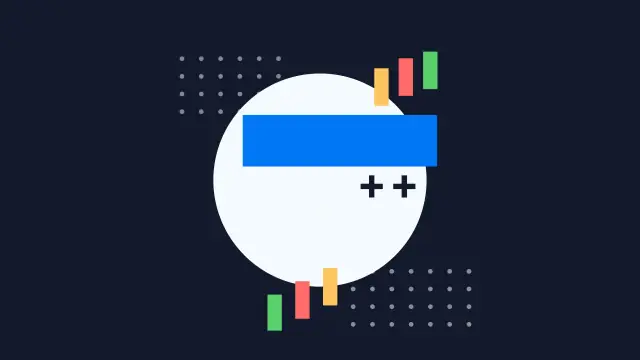
The mobile app development industry is one of the most quickly developing sectors worldwide. The digital revolution and the need for apps by both small and large-scale companies are driving up the demand for different kinds of apps in various industries.
Besides businesses, it is also becoming popular for people to develop apps for personal use. The introduction of no-code development tools and techniques allows you to build a wide range of custom apps through which you can fulfill various business and personal requirements.
Many no-code development platforms are available that help you bring your idea to life without any coding skills. As a result, the no-code development approach has leveled the playing field of mobile app development to a great extent.
Nevertheless, many people still have concerns about whether the no-code tools are good enough to build apps that fulfill their needs. In this article, you will get to know about some of the most important aspects of no-code app development to determine whether it is the best approach for you.
Importance of no-code development
The global IT industry is rapidly growing due to more and more businesses becoming digitalized and the boom of the e-commerce industry. As a result, even the most well-established businesses are facing significant competition and complex market situations.
Companies, small businesses, and budding entrepreneurs need to create software and apps for their businesses. Implementing state-of-the-art technology is essential to boost companies' efficiency, productivity, and profitability.
Moreover, studies also suggest that tech-savvy companies are much more successful and profitable than companies that don't invest in modern tools such as custom apps. Creating mobile and web apps is one way of enhancing a brand's digital presence and ensuring it reaches the target audience. No-code mobile app builder tools have emerged as a reliable and efficient way of ensuring companies and influencers can quickly develop apps and start selling various products and services.
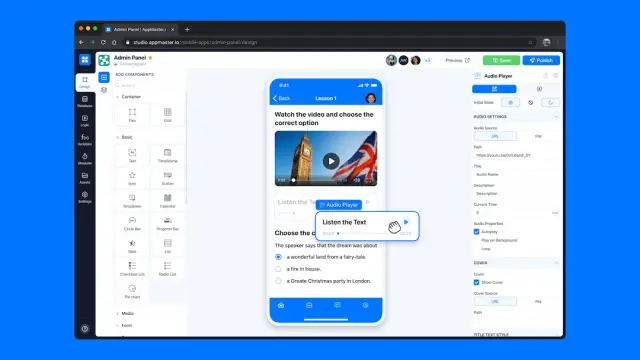
Innovations in no-code development and no-code app builders, such as the ability to add drag-and-drop elements, mean that these platforms are much more than just creating simple apps. In fact, with an efficient no-code development tool like AppMaster, you can turn your complex app ideas into a reality through rapid application development. Keep reading to learn how you can use no-code tools to create software without any programming skills and how it differs from traditional full-code development techniques.
No-code opening doors for non-technical founders
Before diving into the detailed analysis of the no-code development approach and the role drag-and-drop tools play in building custom apps, it is important to get familiar with some basics. Nowadays, many people have started using the terms low-code and no-code interchangeably, but there are some major differences between these two.
Low-code development is meant for people with technical coding skills, even if these skills are limited in scope. However, no-code development has opened the doors of app development for all kinds of non-technical individuals with no coding skills.
You don't have to write a single line of code for backend and frontend development via no-code tools. The primary purpose of the no-code development tools is to facilitate non-technical creators and business founders turning their app idea into actual mobile apps or progressive web apps without writing code.
The innovation and popularity of the no-code development tools have also made them quite popular among experienced developers as well. Professional developers can use the no-code tools to add various drag-and-drop elements to build new custom apps or continuously update existing ones.
What is no-code?
In simple terms, the no-code development approach is a quick and easy way to create mobile apps and develop web apps without writing code. No-code tools are meant for non-technical creators to turn their unique app ideas into a reality without going through the time-consuming and expensive traditional development involving technical knowledge and programming languages.
The kind of flexibility provided by the no-code development approach is not possible in most of the other development techniques. Now, you can start a business and create an app without needing to hire professional app developers. Instead, you can build an entire app from scratch on your own without having coding skills.
Is no code a new idea?
Many people assume that no-code is a new idea in the development industry. In fact, some critics of this development approach have also declared it to be a trend that will pass soon. However, it is important to note that no-code is not some brand-new idea. Innovations and improvements in no-code development tools have made them more popular than ever before.
WordPress and Google Docs are two popular platforms that have been around for many years now. Many people around the world regularly use these two popular IT solutions. It shows that no-code development is not an entirely brand-new concept, but it has certainly evolved to become more efficient and user-friendly.
What can you do with no code?
No-code platforms make many promises, but there are still genuine concerns among many people about whether these platforms can fulfill these promises. If you are also wondering what you can do with no-code, keep reading to learn all about it.
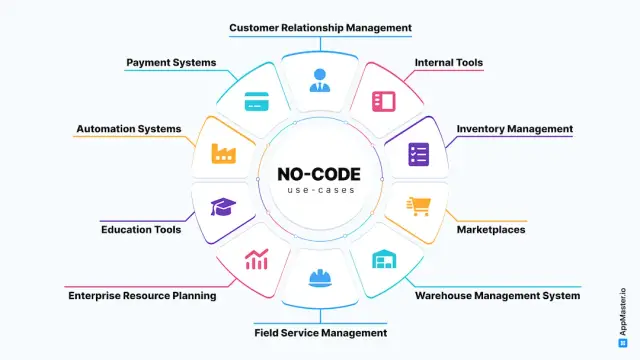
Progress of no-code
From the WYSIWYG editors of the past, no-code web development platforms have advanced significantly. These websites were straightforward and provided a one-way user experience, where they developed respectable designs for the time. Nowadays, more advanced website builders are available in the development industry, enabling the creation of websites with complex visual features, animations, and interactions that the initial no-code platforms were unable to do.
No-code has improved in many different ways, due to which their applications are much more than creating simple web pages. Building internal tools, integrations, voice apps, mobile apps, progressive web apps, and automation can all be done with it. Without learning any kind of code and programming skills, it is feasible to use Voiceflow to develop chatbots, Zapier for linking several apps and making automated procedures, and Shopify to handle online businesses.
Building specialized tools for teams to enhance their business operations is achievable thanks to low-code platforms like Airtable. No-code capabilities are becoming more and more comprehensive with platforms like AppMaster that allow you to build both the backend and front end of a mobile app or web app, along with comprehensive AI-generated documentation.
The pressure of developing a lot of code from scratch is lifted off of developers and other people with deeper technical knowledge, enabling them to focus their time on numerous complicated tasks of running a business or managing an app. They are still necessary even with no code. Their knowledge in designing and optimizing IT solutions will always be in demand.
The value developers have contributed to the world through apps and IT solutions are enormous. Finally, folks without coding experience may contribute their own ideas thanks to no-code tools and platforms. No code allows everyone to create apps, whether it is by giving designers control over a website, helping someone establish a company, or simply enabling developers to focus more on other IT issues.
Prototyping
Platforms that allow you to create apps with the no-code development approach allow you to create apps via drag and drop without dealing with the code. In other words, they transform the foundations of coding into user-friendly visual editing tools, enabling developers to create cutting-edge apps and web apps graphically.
A digital product's first prototypes often don't need nearly as much technical knowledge as they do at the launch phase. Early on, a few well-designed graphics may be all that is required to effectively convey the fundamental concept to possible funders, early users, and future team members. More realism will be needed as the idea develops. Still, even then, tools like Webflow and Bubble may provide immensely rich experiences that may be more than adequate to spark interest and confirm theories.
Quick launch with minimum dependencies
The ability of no-code tools to exclude or restrict the citizen developer from various project operations is what gives them their value. The marketing teams may represent their content in a usable database rather than simply a diagram or spreadsheet if they have the necessary tools at their disposal. No matter what subject they work in, everybody who has ever managed a project understands that the mechanics of delivering it on time and within budget get more challenging the more people you need to acquire work from.
Instead of asking an engineer to construct and link a database to your dynamic content sites, advertising and design teams can quickly create different forms, such as registration forms, and connect them to the app and databases.
Your marketing team will be freed from needing to rely on others to complete tasks, which will hasten and simplify the launch process. There is no need to go through a time-consuming process of asking professional developers to create forms. Instead, you can design and implement the necessary changes yourself.
Your content strategist can take care of the modeling and structure rather than bringing in an engineer to construct and connect a database to your dynamic content sites. Ultimately, a quick launch means you will get more time and energy to focus on core business activities such as promoting the apps.
No-code vs. full code
No-code essentially does what it advertises: it enables non-programmers to create apps without writing any code. Applications are constructed using pre-made components and templates on these platforms. There are benefits to this strategy. It enables quicker development, simplifies app modifications, and eliminates the need for programming knowledge. This strategy does, however, have its limits.
The possibilities for application modification and integration are restricted by no-code. You cannot perform anything if it is not offered as a pre-built component in a no-code platform. Complexity is sacrificed for speed and ease of development. Additionally, you may not be able to create what you need while utilizing a no-code platform since one platform can't support every potential solution that every firm could require.
All of the above is true for most no-code platforms, but not for AppMaster. AppMaster is a software creation tool with code generation. This means that AppMaster does the same for you as the development team. It works according to the same rules. Writes code for you, and documentation for this code, but does it all much faster and better than developers. With AppMaster, you have no technical debt.
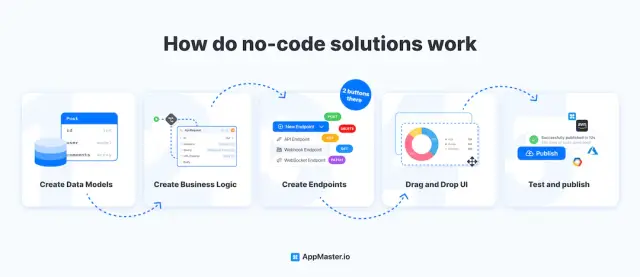
Traditional coding is used in full-code development to design apps. Compared to no-code or low-code, this needs the knowledge of software engineers and takes more time, money, and resources. Additionally, developing and maintaining the apps may be challenging and complicated.
On the other hand, full code may be used to develop distinctive, strong, and complicated programs that meet specific and sophisticated business objectives. Full code also permits intricate connections, which is crucial for businesses with vital legacy systems.
Let's differentiate between no-code and full-code in terms of some important aspects:
Learning curve
A no-code Platform as a Service (PaaS) solution may be created by a non-technical person (citizen developer) with little to no coding skills. Full-code and low-code projects, which need a hands-on approach to building and optimizing code from the start, are best suited for seasoned and experienced developers.
There is no technical knowledge required to create an application with no code. No previous knowledge is necessary; simply get going and start developing. Low-code platforms, on the other hand, are only appropriate for those with development experience since they feature complicated tools and can change the access code.
Software engineers are needed because full-code is a very demanding coding-centric strategy. The apps might be difficult to create and manage, so it's better to leave them in the care of knowledgeable experts with plenty of expertise. The same is true for low code. However, there would be somewhat less coding needed since it does allow for the automation of certain menial activities. The kind of steep learning curve associated with traditional development approaches is a major reason why many people nowadays prefer no-code mobile app development.
Costs
Enterprise-scale API s, web service catalogs, tried-and-true template galleries, and open data sets are all used in no-code application development to lessen the cost and complexity of the app development process. With a no-code solution, even novices can manage app development, so you may not need to spend a lot of money on specialized personnel.
Your per-head costs decrease as you use fewer resources. Low code would need some coding knowledge, and hiring skilled developers is necessary to do it correctly. The same is true for Full-code since generating complicated code demands highly trained developer personnel that can take your concept from concept to reality. Senior developers aren't always the most economical.
It takes time to create high-end customized apps using custom development. Time and money are wasted on mistakes, corrections, repeat runs, and iterations. No-code is cost-effective, but if your app needs a redesign or additional features that are not present in the library, the expenses might soar, putting you in a difficult financial scenario. No-code offers the best of both worlds in this situation.
Time to market
The drag-and-drop interface and visual design tools in no-code speed up mobile app development. Full-code development is time-consuming and necessitates starting from scratch. The low-code option, however, offers a delicious middle ground between the two. As a result, it takes less time than full-code and a little longer than no-code.
Full-code and low-code need hand coding in the old-fashioned way, which takes time. Developers merely need to drag graphic blocks into the user interface for the pre-built no-code components. Low-code platforms dominate when it comes to creating quick and easy apps because of their hands-off attitude, which makes it simpler to release apps on development.
To expedite the development of apps, no-code provides a what-you-see-is-what-you-get app interface. The app may be finished more quickly because of the pre-built widgets, 100% visual capabilities, and no coding required. All of this is provided by low code, and you may change the script to improve what you already have. Full-high code's coding complexity makes it more difficult to reduce development time.
Integration & migration
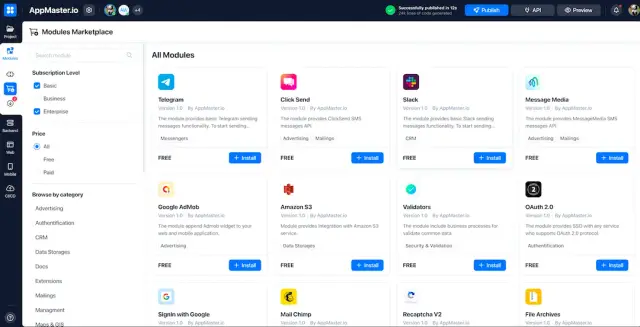
Modern no-code development tools like AppMaster provides a wide range of integration options to ensure you can easily connect your mobile apps and custom apps with numerous platforms. You don't have to make many efforts to benefit from these numerous integrations.
Nowadays, full-code development frameworks also offer many popular integration options. Yet, ensuring efficient integration and migration in traditional development procedures is much more difficult than the no-code development approaches.
Are no-code apps the future?
Yes, no-code development and no-code apps are definitely the future due to the following reasons:
Meet growing IT demands
The market for mobile app development services will expand at least five times more quickly than IT can provide them, as per Gartner. The continually rising needs of software development may be met with no-code citizen development. Developers may concentrate on important problems since no-code citizen mobile app development frees up their minds.
Rising importance of cloud technology
Previously, sophisticated tools and technology were only available to wealthy developers and large-scale tech companies. Large IT companies could only use it to preserve the heritage and create apps. Small companies typically do not have enough resources to buy the hardware and IT infrastructure and invest in mobile app development. Updating the apps was equally complex and costly. Systems thus remained inflexible and small companies suffered due to a lack of access to modern tools and technology.
Nowadays, most software and applications have shifted towards cloud systems. It has leveled the playing field for all kinds of companies. Small companies are paving the path for innovation by relying on no-code platforms and creating apps that are useful for the business as well as the consumers.
Save resources
Finding IT developers or coding experts may be difficult and expensive, particularly for new organizations. In the past, businesses hired programmers from abroad to assist with coding and developing commercial applications. Developing a single application required months and was both times- and money-consuming. Businesses may now utilize no-code platforms to create applications with the help of their own staff. The building or employing professionals for the development process doesn't come at an additional expense.
Collaboration and productivity
Both clients and businesses use no-code development platforms. The platform is open to all users, allowing them to provide comments. The organization makes use of the data to create a program that meets the requirements. The ability to create applications using cutting-edge technologies is available to basic IT users.
All users may utilize No-code regardless of their degree and skill level. The useful visual modeling tools enable citizen developers to create commercial applications. IT experts are still required despite the software. But it improves the abilities they use in the workplace. IT programmers may assist with security issues by developing a distinctive and secure application for the company.
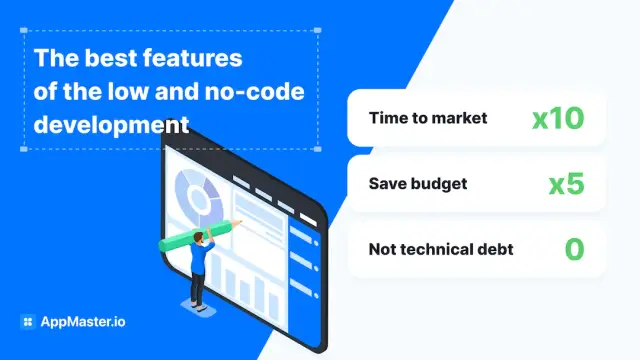
No-code boosts productivity by enhancing agility through the best no-code app platforms. Most business products include automated processes that make it easier for firms to do more tasks without strain. By enabling staff to use technology in their work, the software aids in revenue growth. Their morale is raised. As a result, it encourages them to generate more.
Key aspects of no-code development
You should definitely choose the best no-code app platforms like AppMaster to create mobile apps or progressive web apps because it can help you in the following situations:
- Limited financial or IT resources working in a small setup with a small staff.
- In search of straightforward updates and simple solutions.
- These platforms claim to produce solutions in a short period of time.
The future of software development and mobile app development is expected to revolve around no-code tools. Citizens will construct more and more applications in the future utilizing low- and no-code platforms, which will offer the required control throughout development procedures and business functions. Therefore, you should definitely start using the best no-code app platforms to get maximum benefits from modern mobile app development.





